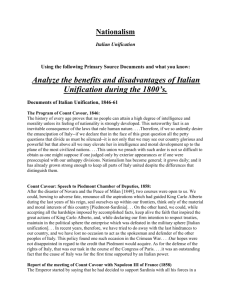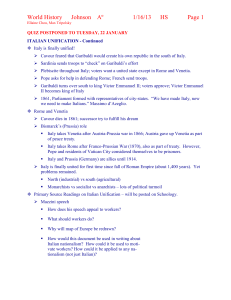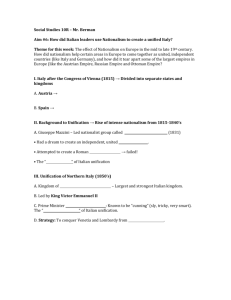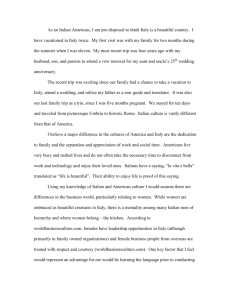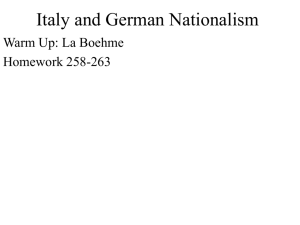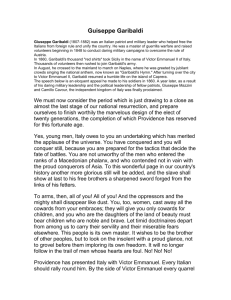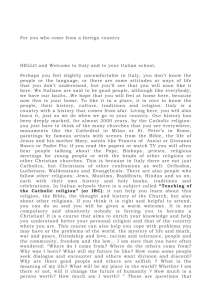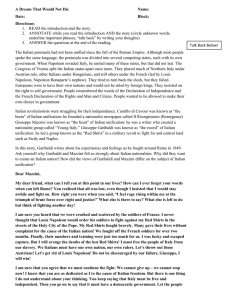giuseppe mazzini
advertisement
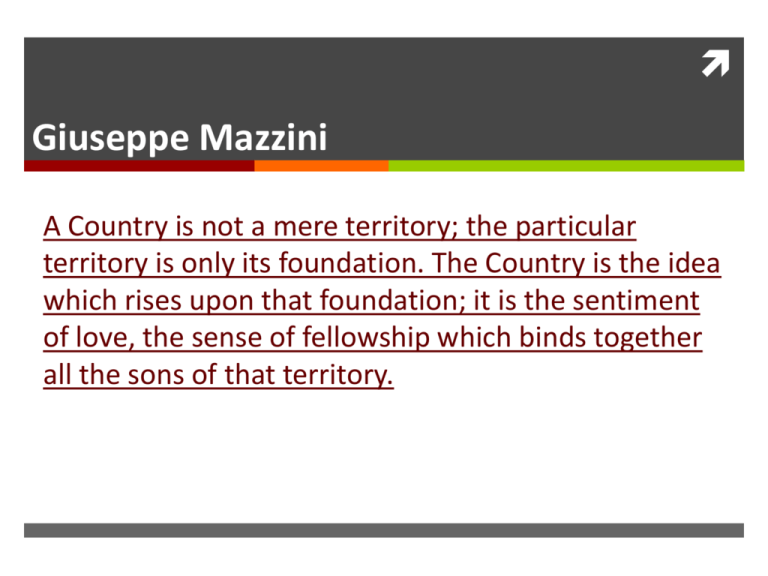
Giuseppe Mazzini A Country is not a mere territory; the particular territory is only its foundation. The Country is the idea which rises upon that foundation; it is the sentiment of love, the sense of fellowship which binds together all the sons of that territory. Giuseppe Garibaldi “Give me the ready hand rather than the ready tongue.” Giuseppe Garibaldi I offer neither pay, nor quarters, nor food; I offer only hunger, thirst, forced marches, battles and death. Let him who loves his country with his heart, and not merely with his lips, follow me. Giuseppe Mazzini So long as you are ready to die for humanity, the life of your country is immortal. victor emmanuel Victor Emmanuel II (Vittorio Emanuele Maria Alberto Eugenio Ferdinando Tommaso; 14 March 1820 – 9 January 1878) was king of Sardinia from 1849 until, on 17 March 1861, he assumed the title King of Italy to become the first king of a united Italy since the 6th century, a title he held until his death in 1878. The Italians gave him the epithet Father of the Fatherland. After the Kingdom of Italy was established he decided to continue on as King Victor Emanuel II instead of Victor Emanuel I of Italy. This was a terrible move as far as public relations went as it was not indicative of the fresh start that the Italian people wanted and suggested that Sardinia-Piedmont had taken over the Italian Peninsula, rather than unifying it. Despite this mishap, the remainder of Victor Emanuel II’s reign was consumed by wrapping up loose ends and dealing with economic and cultural issues. BELLWORK Why would small kingdoms want to unify to become one larger country? otto van bismark Otto von Bismarck, in full Otto Eduard Leopold, prime minister of Prussia (1862–73, 1873–90) and founder and first chancellor (1871–90) of the German Empire. Once the empire was established, he actively and skillfully pursued pacific policies in foreign affairs, succeeding in preserving the peace in Europe for about two decades. wilhelm of prussia Frederick III, also called (until 1888) Crown Prince Frederick William, king of Prussia and German emperor for 99 days in 1888, during which time he was a voiceless invalid, dying of throat cancer. Although influenced by liberal, constitutional, and middle-class ideas, he retained a strong sense of the Hohenzollern royal and imperial dignity. giuseppe garibaldi Giuseppe Garibaldi, (born July 4, 1807, Nice, French Empire [now in France]—died June 2, 1882, Caprera, Italy), Italian patriot and soldier of the Risorgimento (or Italian Revolution), a republican who, through his conquest of Sicily and Naples with his guerrilla Redshirts, contributed to the achievement of Italian unification under the royal House of Savoy. Garibaldi was a central figure in the Italian Risorgimento, since he personally commanded and fought in many military campaigns that led eventually to the formation of a unified Italy. giuseppe mazzini Giuseppe Mazzini, (born June 22, 1805, Genoa [Italy]—died March 10, 1872, Pisa, Italy), Genoese propagandist and revolutionary, founder of the secret revolutionary society Young Italy (1832), and a champion of the movement for Italian unity known as the Risorgimento. An uncompromising republican, he refused to participate in the parliamentary government that was established under the monarchy of the House of Savoy when Italy became unified and independent. He was nicknamed The Beating Heart of Italy,[1] was an Italian politician, journalist and activist for the unification of Italy. His efforts helped bring about the independent and unified Italy[2] in place of the several separate states, many dominated by foreign powers, that existed until the 19th century. He also helped define the modern European movement for popular democracy in a republican state count cavour Camillo Benso, count di Cavour, a conservative whose exploitation of international rivalries and of revolutionary movements brought about the unification of Italy (1861) under the House of Savoy, with himself as the first prime minister of the new kingdom. He was a leading figure in the movement toward Italian unification. He was the founder of the original Liberal Party and Prime Minister of the Kingdom of Piedmont-Sardinia, a position he maintained (except for a six-month resignation) throughout the Second Italian War of Independence and Garibaldi's campaigns to unite Italy. After the declaration of a united Kingdom of Italy, Cavour took office as Italy's first Prime Minister; he died after only three months in office, and thus did not live to see Venetia or Rome as part of the new Italian nation.
